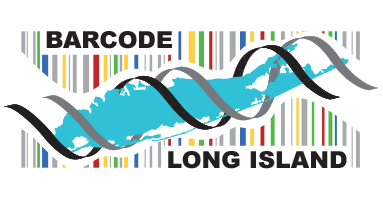These are the guidelines for participating in Barcode Long Island (BLI). All participants are required to read and comply with these rules. Any team whose participants violate these rules will lose support and be asked to leave the project. The DNA Learning Center reserves the right to interpret and amend these rules at any time, for any reason; all decisions by the project staff are final.
Eligibility:
- All entries must be made by a student team with a BLI mentor.
- Each student team can include 2-4 members enrolled in grades 9-12 at public or private high schools in Long Island, NY as defined by the four counties it includes: Queens, Kings, Nassau, and Suffolk.
- Students on a team do not need to be from the same school.
- Each student can only be a member of one team.
- BLI mentors must be science educators who are qualified to teach students at a public or private high school or college in Long Island, Brooklyn, or Queens to sponsor a team.
- Mentors must have completed one DNA barcoding workshop led by BLI staff.
- BLI mentors agree to ensure students they sponsor are properly supervised for all competition-related activities. Mentors are also responsible for enforcing all safety regulations required by BLI and all rules and regulations required by the students’ local schools and school boards.
- BLI mentors will usually sponsor students from their own schools. At their discretion, they may sponsor teams composed of students from their own and/or other schools.
Entry Requirements: Project Proposal
Students must submit a proposal (max. 5 pages) for an investigation that satisfies the following requirements:
- Investigations must make use of DNA barcoding to study the biodiversity of Long Island and/or its surrounding waters.
- Investigations may not involve the collection of samples that are of known risk to human health, including blood, other bodily fluids, or clinical samples.
- Reagents and materials for DNA isolation and sequencing for a maximum of twenty samples, sequenced in both the forward and reverse directions, will be provided to each team. Any laboratory materials used outside of those provided by must be detailed in the proposal.
- All projects must specify in detail what samples they propose to collect, including: type of samples, estimated number of samples, how these samples will be collected, where these samples will be collected, and what efforts, if any, are needed to minimize damage to specimens or the environment during the collection process.
- No team may employ methods to collect samples which put team members or other people at risk of harm.
- The project may not involve harming or destroying vertebrates.
- The project must minimize any damage to animals or plants, whether found on public or private property. If in doubt of the status, collection should not proceed until expert help determines the status of the organism(s). In most cases, plant samples should not exceed a single leaf or needle. For invertebrates, the number of individuals that are sampled should be minimized. Collection of whole plants is prohibited. No threatened or endangered organisms may be collected. All NY state species listed on the US Fish & Wildlife Service Environmental Conservation Online System should never be collected because they are state protected.
- Samples may not be collected from any public or private location without authorization.
- Teams must document authorization to collect and specify in detail the collection location, the reason they need entry, what safety hazards (if any) are present, and what safety precautions (if any) will be taken. This documentation must be signed and verified by the BLI mentor, the principal of the students’ school(s), the students, and the parents of all minors on the team.
- No team may violate any laws or statutes as part of their participation in BLI.
- Participants agree to assume any and all responsibility for all their actions connected with participation in BLI. Participants agree to assume full liability for any damages, injuries, or liabilities connected with their participation in BLI.
BLI Proposal Submission:
Student proposals are reviewed on a rolling basis, but as in previous years we are providing multiple submission dates to help organize teams. The proposal review usually takes 1-2 weeks, though campaign project review may be expedited. The FINAL deadline for initial submission will be Wednesday, December 11, 2024. There will be no exceptions.
- Deadline 1: Wednesday, September 25, 2024
- Deadline 2: Wednesday, October 16, 2024
- Deadline 3: Wednesday, November 13, 2024
- FINAL DEADLINE: Wednesday, December 11, 2024
BLI guidelines for participation can be found under the BLI section of Resources. Please review your students' proposals to ensure their proposed research meets our guidelines, includes appropriate references to the literature (as needed), and meets your writing standards before submission.


